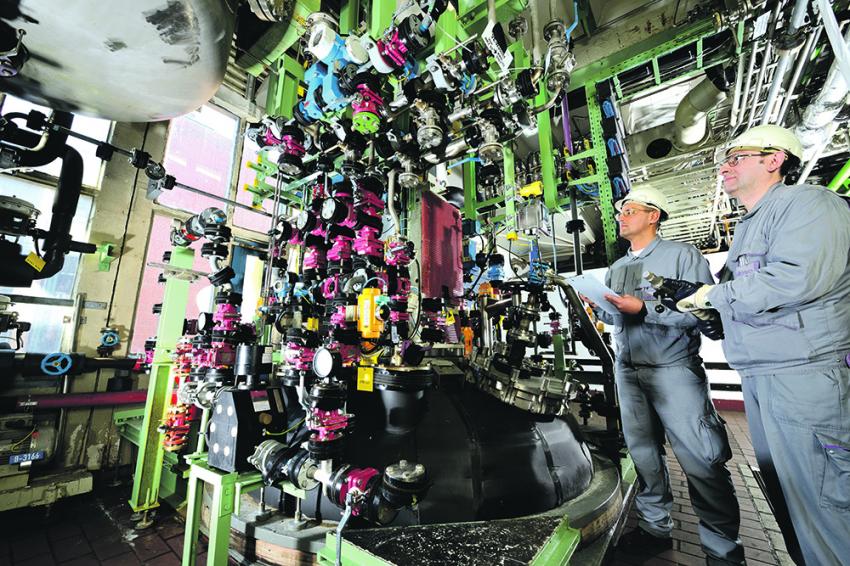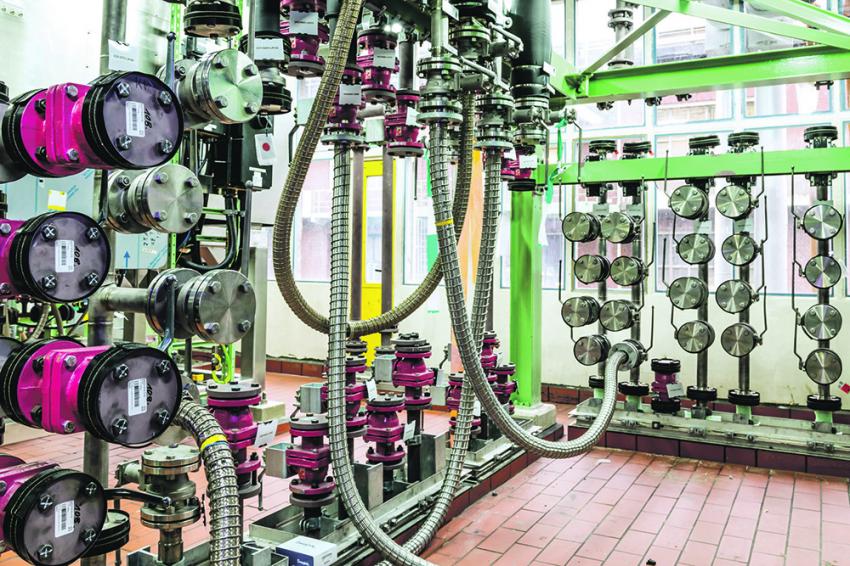Modular In Every Respect
Efficient and Flexible Exclusive Synthesis at Saltigo
“Modular” is currently an often-quoted buzzword in the process industry – in process technology and engineering, automation and supply chain management. But what is often still being discussed as a novelty for continuous production plants is already firmly established in batch production. There are good reasons for this.
Especially in the area of exclusive synthesis, where flexibility, efficiency and speed are of particular importance, modular production concepts show their strengths. The prerequisite, however, is their intelligent and above all holistic implementation. Boris Bosch, Plant Manager Plant 5/ZeTO at Saltigo, points out: “Modular production means more than just being able to interconnect devices in different ways. Modularity must be anchored throughout a production plant: in the planning and engineering of procedural components, in automation and in the operating procedures.” At Saltigo, modularity is a reality on all these levels.
Modularity Requires Interaction
Only if modules are able to interact efficiently, can the advantages be realized for the entire process. This is illustrated by the consideration of plants and utilities at a production site. Saltigo distinguishes between multi-purpose and so-called technology plants with special tasks, e.g. reactions under high pressure or the processing of products or solvents by distillation. Here, modularity means creating organizational processes and technical prerequisites for flexible and efficient cooperation. This includes uniform campaign planning as well as the necessary infrastructure, i.e. interim storage, buffer containers, pipelines and pipe bridges.
A versatile supply and disposal system is also part of this modular network. The Chempark offers central access to important energies and raw materials, its own port facilities and truck terminals, as well as its own plants for waste incineration, sewage treatment and landfill. In addition, Saltigo also has “in-house” facilities, such as thermal exhaust air purification systems in several plants as well as various facilities for tank container storage.
Modular Process Technology – More than Just Package Units
In order to ensure that production lines can be composed of modular units in a highly flexible way, this capability must be taken into account already in the planning phase, during construction and equipping of each individual component or unit. “We have defined a few standard configurations, e.g. for stirring vessels. This means that most of our vessels can actually be used at almost any point in a synthesis,” says Bosch. In addition to the basic functionalities standardized for each type of equipment, individual appliances have additional capabilities. For example, there are vessels that can be operated at very high or low temperatures, under pressure or vacuum. These also have all the basic functionalities. Therefore, the equipment inventory is interchangeable within a wide range, and the space and capital requirements for spare parts are reduced considerably. “All in all, all of our devices make up an intelligently equipped toolbox,” summarizes Bosch.
Saltigo relies on so-called pipe junction stations, among other facilities, to ensure that the connection of various devices to form new combinations – as required by the synthesis process – can be carried out efficiently. In the Central Organics Pilot Plant (Zentrales Technikum Organisch, ZeTO) alone, there are twelve such interfaces. They enable material flow by bringing together pipe connections of numerous apparatuses. Bridged with flexible hoses, almost any circuitry can be realized easily and quickly.
Automation: Flexibility Built in
If standardization is to bring benefits, it must not be limited to process technology. Especially for highly automated processes, automation and process control technology must be highly flexible as well. The best example of this is the two new production lines in the ZeTO. They are specially designed for large-volume solids production and were commissioned at the end of 2017.
With an automation level of close to 100% and powerful recipe control, these units can produce almost fully automatically. For this purpose, not only were approx. 14 km of piping newly installed, but also approx. 115 km of cable. As a result, all components of these multi-purpose plants are prepared – also in terms of measurement and control technology – from the planning and engineering stages to meet all the requirements that will be placed on them later in their day-to-day operations. Nevertheless, automation only requires a comparatively small typicals library. Thanks to extensive standardization, it comprises only 35 basic function typicals and 21 basic function element typicals.
In individual cases, this means that such a standardized reaction vessel has significantly more feeders and discharges, sensors and actuators, control loops and control parameters than would be required for a single, dedicated synthesis. For the new lines alone, there are more than 1,000 sensors and almost 900 actuators. The I/O channels are correspondingly numerous. With over 3,200, they account for around 30% of all I/O channels managed by the central control system in the ZeTO. About three quarters of these are digital, and various third-party systems such as scales, pumps and centrifuges are connected via Profibus and Profinet.
Made-to-measure Analysis
“The trick is to find a reasonable compromise between the greatest possible flexibility and adequate measurement and automation equipment,” explains Bosch. This is also evident in the equipping of the production lines with sensors, including substance-specific online analysis. While numerous sensors for basic, predictably necessary measuring points are already permanently integrated into the process and automation technology modules, it is possible to easily and quickly retrofit additional measuring points if they are necessary or helpful for a specific production. Additional flanges are already available at suitable locations.
In this way, project or process specific measurement and documentation requirements can also be met. Such requirements were originally set up for the production of active pharmaceutical ingredients within the framework of a “Quality by Design” approach. In doing so, not a downstream product control in the laboratory and subsequent batch release, but online monitoring of quality-relevant parameters ensures that the product conforms to the specification. In principle, such a procedure can help – even beyond pharmaceutical production – to reduce costs that would otherwise be incurred for manual laboratory analyses or – in the worst-case scenario – for the processing or disposal of off-spec products. If such quality-sensitive measurement data are used as input variables for control in a closed-loop manner, this paves the way for fully automated, ideal batch production (“golden batch”).
Modular Operating Procedures
Modularization must not stop at the organization of business processes. At Saltigo, for example, the cleaning of apparatus following a production campaign is also organized on a modular basis. Modules can be cleaned separately and are already available for other applications when production is still running in other parts of the plant. “A clever module definition opens up considerable profitability reserves here too,” Bosch reveals. Similarly, maintenance and repair can be organized on a module basis, which also leads to higher availability of the asset base and thus to a capacity gain.
Contact
Saltigo
Chempark
51369 Leverkusen
Germany










